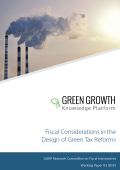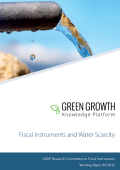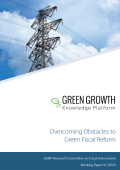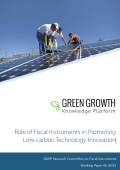
This GGKP working paper develops a conceptual framework that allows policymakers to estimate the revenue potential of an envisioned environmental fiscal reform (EFR) instrument.

This GGKP working paper searches for ways to improve the role of fiscal instruments and approaches in the management of water scarcity and the pursuit of inclusive development objectives.

The GGKP working paper highlights the importance of identifying potential impacts of GFR, including the range of costs and benefits, winners and losers, and intended and unintended effects across different spheres.

This GGKP working paper reviews the best practices associated with the choice and design of fiscal instruments for low-carbon technologies and identifies the main lessons learned from their implementation in the case of renewable energy.

This report presents a model that analyses fossil fuel subsidy reform across 20 countries showing an average reduction in national GHG emissions of 11% by 2020, and average annual government savings of USD 93 per tonne of CO2 abated. With a modest recycling of resources to renewables and energy efficiency, emissions reductions can be improved to an average of 18%. Some countries have included reforms in Intended Nationally Determined Contributions, toward a climate agreement. The report presents case studies from Morocco, Philippines and Jordan and was authored by the Global Subsidies Initiative of IISD, as part of the Nordic Prime Ministers’ green growth initiative.
